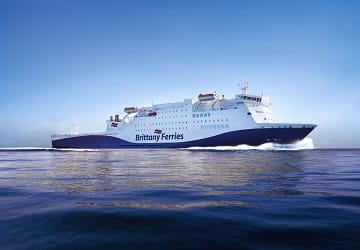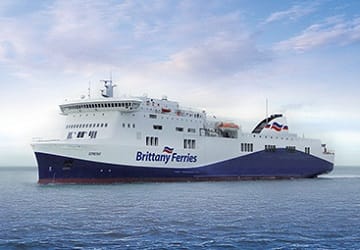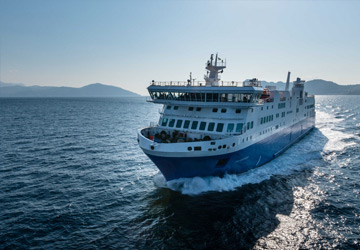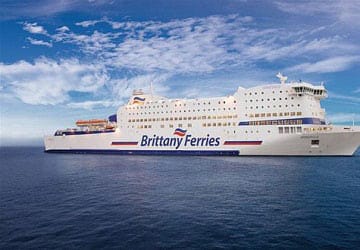
-
Recent Searches
Recent Searches
- Travel Alerts
- My Account
- Customer Service
-
United Kingdom
Portsmouth to Le Havre Ferry
The Portsmouth Le Havre ferry route connects England with France. Currently there is just the 1 ferry company operating this ferry service, Brittany Ferries. The crossing operates up to 7 times each week with sailing durations from around 8 hours.
Le Havre ferry sailing durations from Portsmouth and frequency may vary from season to season so we’d advise doing a live check to get the most up to date information.
Portsmouth to Le Havre Ferry Alternatives
-

-
Get price
-
-

-
Get price
-
-

-
Get price
-
-

-
Get price
-
-

-
Get price
-
-

-
Get price
-
Average Portsmouth Le Havre Prices
Prices shown represent the average one way price paid by our customers. The most common booking on the Portsmouth Le Havre route is a car and 2 passengers.
Portsmouth Le Havre Ferry reviews
-
"Brittany Ferries"
Overall, I was very satisfied. Very friendly staff. Good food. My cabin was nice but the bathroom smell was not that great.
'Martin' travelled Portsmouth Le Havre with Brittany Ferries on Etretat
Read More Read Less -
"Le havre crossing"
Value for money
'Stephen' travelled Portsmouth Le Havre with Brittany Ferries on Etretat
Read More Read Less -
"the badger's abroad "
Fantastic trip everything about sailing was just great.
'Gerald' travelled Portsmouth Le Havre with Brittany Ferries on Etretat
Read More Read Less -
"Cheap and cheerful"
Brittany Ferries normally provide an upmarket ferry service with superior accommodation and an excellent restaurant. The Portsmouth/le Havre service is unashamedly more basic and is priced accordingly. This service is primarily a trucking route and cars make up a minority of the ferry loading. The car passenger facilities are perfectly adequate but are quite basic (eg there is a café but not a full-service restaurant). One needs to be aware that most of the cars are parked in the open air on the top vehicle deck. There is good screening but, in rougher weather, I suspect some salt water may get deposited on one's vehicle. Drivers need to be aware that some manoeuvring is required when exiting the ferry as many of the cars have to be turned round. The Brittany Ferries staff are helpful in guiding drivers but, particularly when it's dark, its a more fiddly experience than normal roll-on and roll-off ferries. This could be a problem if driving a larger car. The need to manoeuvre so many cars means that it can be quite time consuming to disembark. This drawback is offset by the rapid Border Control processes. With fewer cars than most cross channel ferries there is less of a queue at passport control - a very welcome feature. Overall, this is a good and well organised no-frills service and I one I'd recommend if you don't require the more deluxe service offered by Brittany Ferries' other routes.
'James' travelled Portsmouth Le Havre with Brittany Ferries on Etretat
Read More Read Less
Portsmouth Guide
Portsmouth is one of the best connected ports in the United Kingdom, serving nine different destinations across Europe with operators including Condor Ferries and Brittany Ferries. To the south of the naval base, you will find the Isle of Wight (Ryde) Passenger Ferry Terminal, while the Continental Ferry Terminal serves Le Havre in France and Bilbao in Spain. There are also daily crossings to Cherbourg, Caen and St Malo in France, St Helier in Jersey and St Peter Port in Guernsey.
Located on the south coast of England, in the county of Hampshire, Portsmouth is the UK's only island city, situated around 100 km to the south west of London and 30 km to the east of Southampton. The city's long history is inextricably linked to the sea, hosting to the oldest dry dock in the world still used today and also to famous ships such as HMS Victory, Admiral Lord Nelson's flagship; the Mary Rose, and HMS Warrior.
Le Havre Guide
Le Havre is a French city and port that was founded by King Francis I in 1517 after the ports of Hornfleur and Harfleur, on the Seine estuary, silted up. Le Havre was enlarged during the first part of the 19th century by pushing back the city's ramparts and then later in the century by demolition them totally. The city's fast development and demography has been influenced by a number of events that occurred in the town's relatively recent history. First, during the 17th century Le Havre was a war port, then it was a successful trading port during the 18th century and during the 19th century many people emigrated to America. The city's industrialisation that commenced in the 1920's made it an important town and port for the Normandy region thanks to its global trade in coffee and cotton and in 2005 Le Havre's city was declared a UNESCO World Heritage Site in recognition of the works of architect Auguste Perret. He was labelled a "concrete poet" and an innovator and managed to successfully combine modern architecture with traditional architecture.
Le Havre is a deep-water port which can be accessed 24/7 unhindered by the tides and welcomes ships of all sizes. Ferry services operating from the port depart to Portsmouth on the south coast of England.




